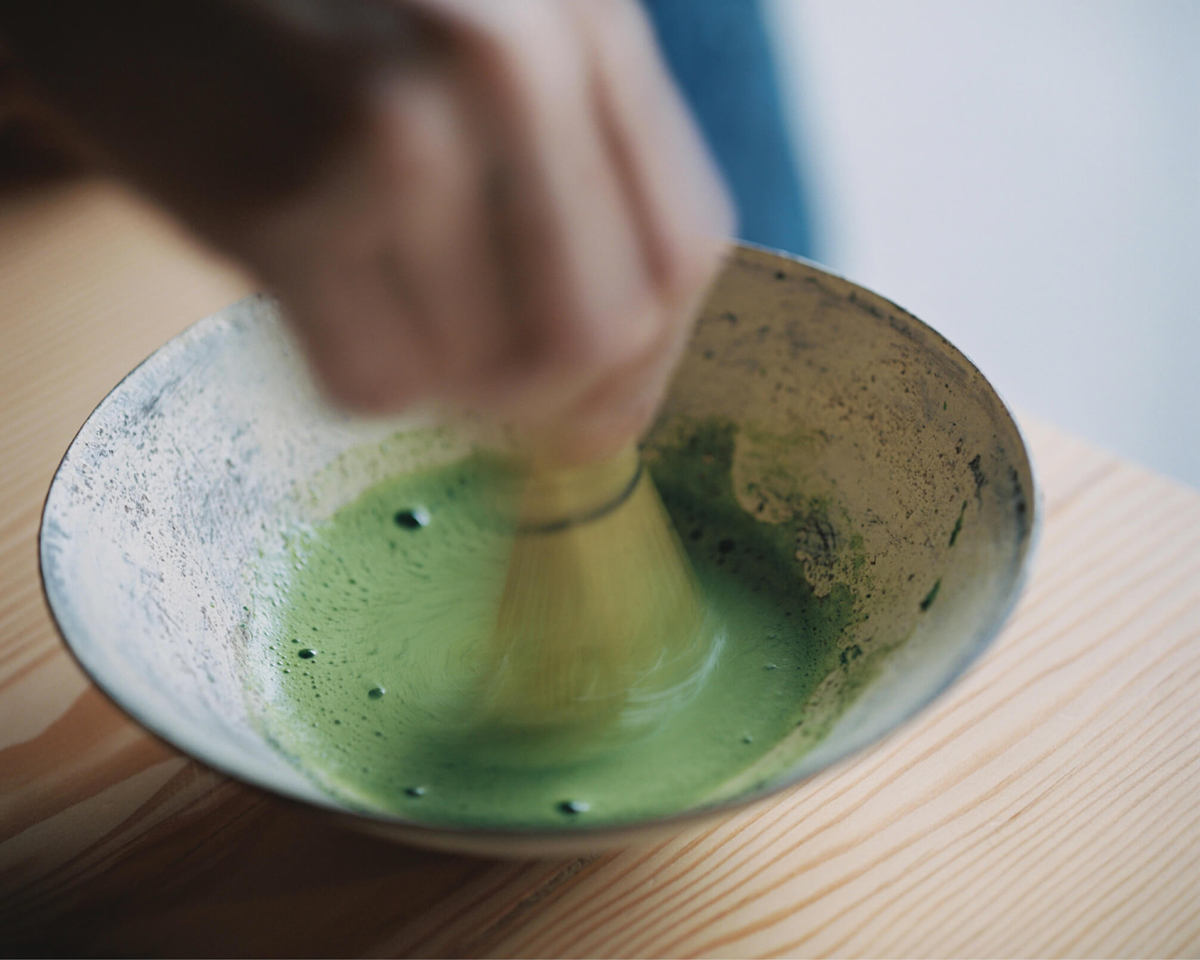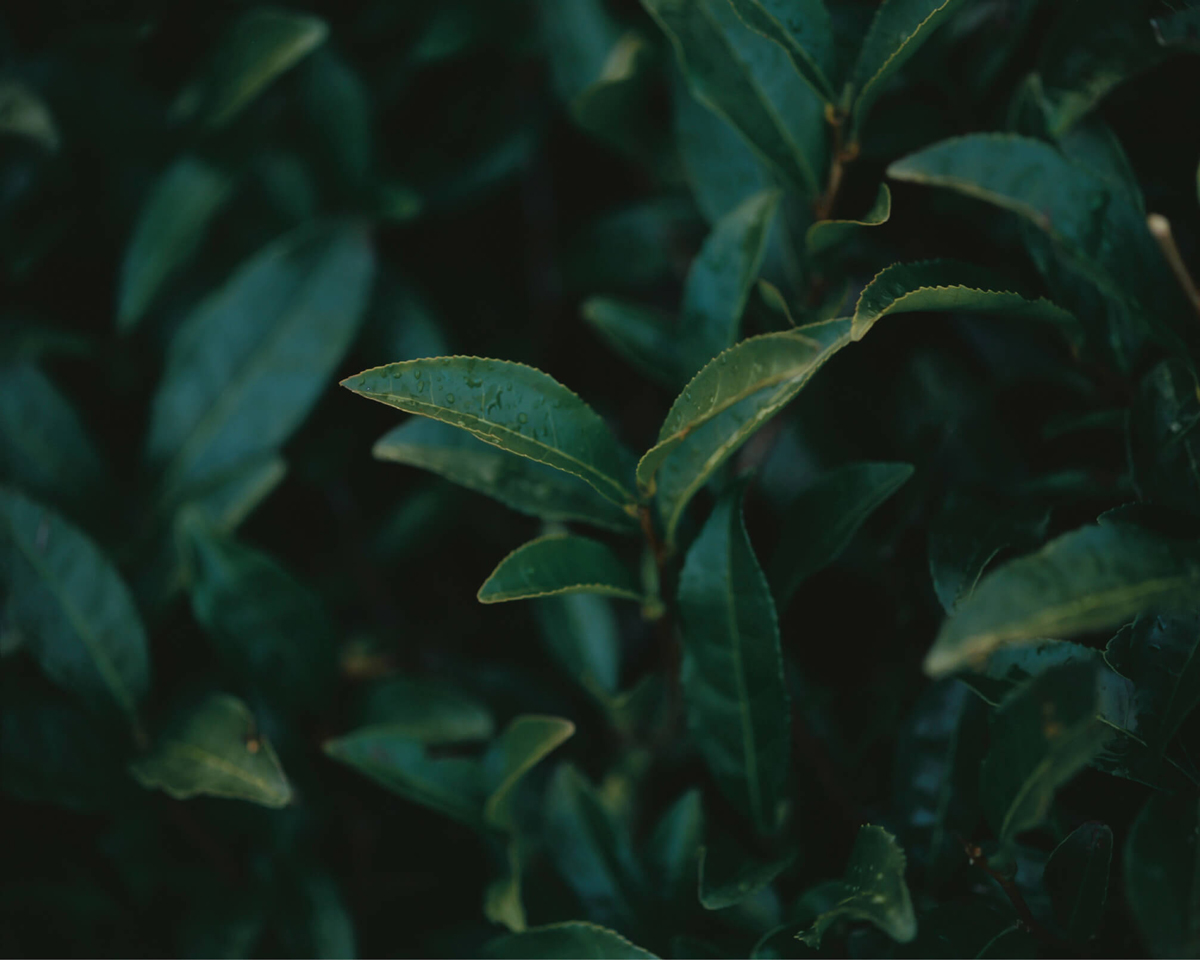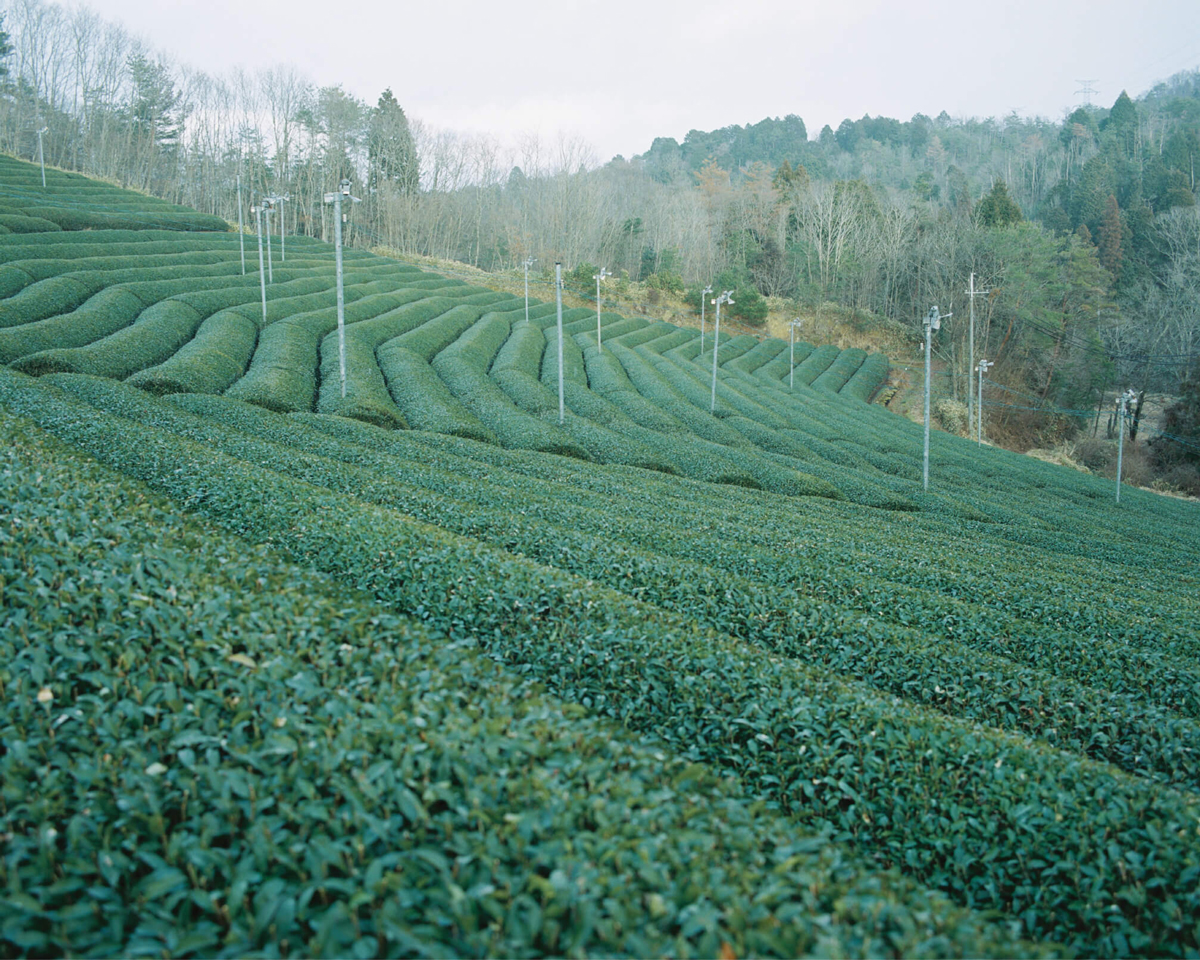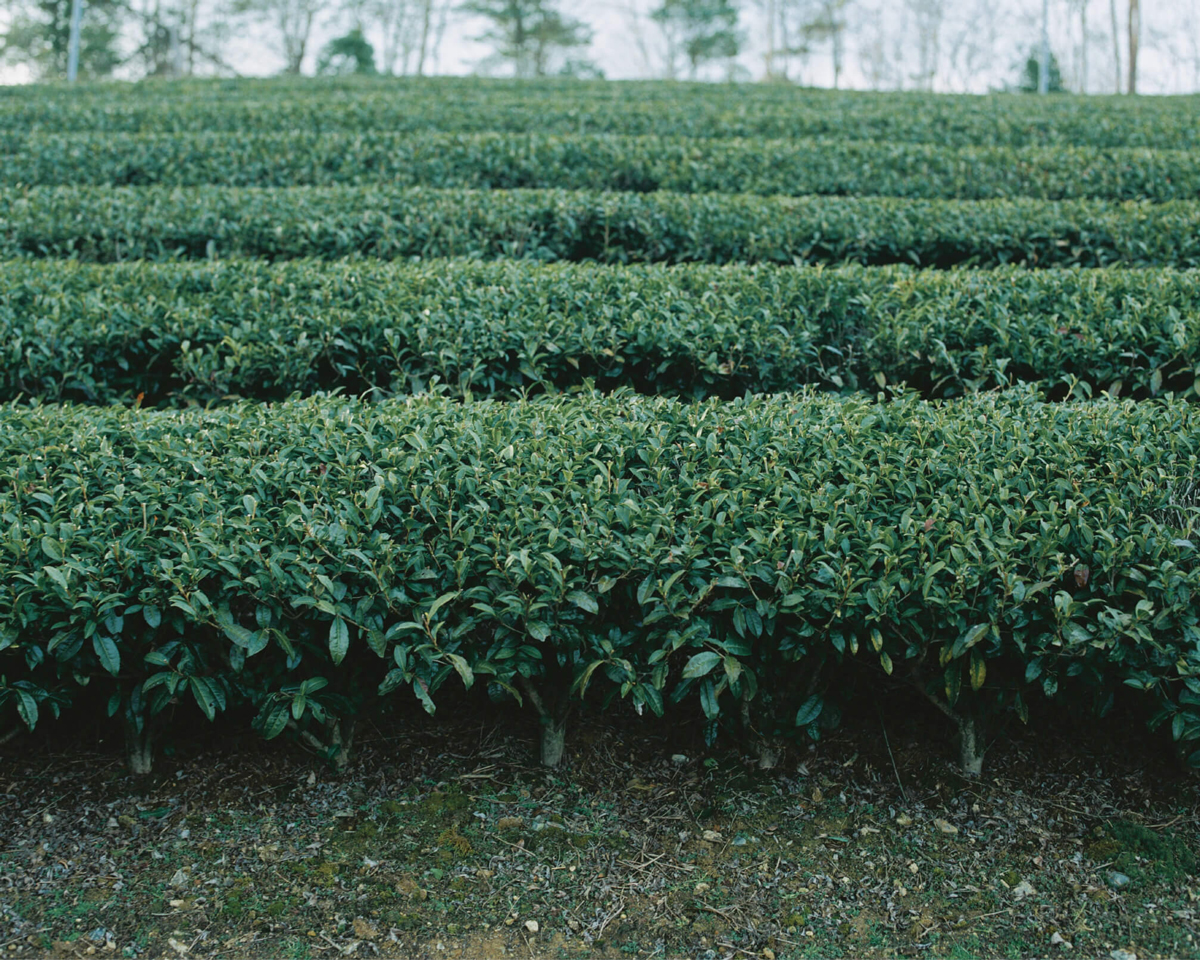日本最古の銘茶朝宮茶の歴史と変革
日本の史書には茶の飲用に関する記述も数多く残されています。その中でももっとも古いのが日本後紀の滋賀の茶に関する記述と言われており、天皇が滋賀県大津市に訪れた際、茶を献上したことが記されています。
朝宮茶は、約1200年前、後に比叡山に延暦寺を開いた最澄が遣唐使として中国に渡って仏教を学んだ後、色んな物を日本に持ち帰ってきた中の一つに茶の種があって、それが近江の朝宮に伝わったのが朝宮茶の起源。その当時お茶は楽しむものではなく、漢方薬的な存在だったようです。
The oldest refined Japanese tea The history and reformation of Asamiya tea.
There are many descriptions of tea drinking in Japanese history books. The earliest of these is said to be the description of Shiga tea in the book "Nihon Koki".
About 1,200 years ago, Saicho, who built the Hienzan Enryaku-ji Temple, visited China as an envoy to study Buddhism, and then brought various things back to Japan that includes a seed of tea. The origin of Asamiya tea is that the seed was introduced to Asamiya region in Omi. At that time, tea was not for enjoyment but was used as a Chinese medicine.

― (THISIS)SHIZENでは完全オーガニックの茶畑で育てた茶葉を取り扱わせていただくことになりました。現在茶のみやぐらさんの茶畑の約1/3くらいがオーガニックだそうですね。やはり手をかける行程はそうでない栽培とは違うのでしょうか。そしてオーガニックの茶畑に踏み込んだきっかけとは?
— (THISIS) SHIZEN will handle tea leaves grown in completely organic tea plantations. Currently, about 1/3 of the tea garden is organic. Is the process different between organic and non-organic cultivation? And how did you get into the organic tea plantation?
作る側と選ぶ側のこの時代に最適な考え方
このあたりは5年前からはじめたオーガニックの茶畑で、昨年(2019年)の春に有機JASの認証を取得しました。お茶のように何年にもわたり育ち続ける多年生作物は、3年間の中で化学物質や農薬と化学肥料(一部を除く)を使わず肥培管理していることなどを条件に、やっとJASの認証が取れるんです。オーガーニックに踏み込んだきっかけは、問屋さんやお客さんからの要望が多かったからです。オーガニックだと害虫がよく発生するようになったり、その上味は化学肥料を使ったものとあまり変わらない。しかし、窒素分の多い化学肥料の大量投入が環境に悪影響を及ぼしたり、生態系に負担をかけてしまう。そういったことをなくしていこうという時代に変わってきました。すべての茶畑まではオーガニックにできていないですが、そういう自然や環境への考えを理解して、オーガニック栽培での茶葉を選んで買ってくださる方がいるんです。
茶のみやぐらは、僕の父親の代から農家をはじめました。父は現在73歳。彼が20~40代の頃って全国的にお茶産業の景気が良かったんですよね。お茶を作れば作るほどいい値段で売れていた時代は、肥料を大量投入しちゃえっていう考え方もありましたが、現在は需要と供給のバランスが崩れていて圧倒的に供給の方が多い。つまり毎年お茶が余っている状況なんです。野菜の場合、不作の年は値段が上がりますが、お茶の場合は品質を保ったまま何年か保管できるので、不作だからといって値段は高くなりづらいんです。そうなると、自分のお茶づくりに対するスタンスがはっきりしている人でないと、やっていけない。安いから、美味しいからだけではない茶葉を作らなきゃいけない。理念に共感してもらえないと買ってもらえない時代になったんです。
The most suitable idea in this era for makers and consumers
This is an organic tea plantation that we started five years ago, and we acquired JAS certification data last spring (2019). Pluripotent plants, such as tea, that have been growing for many years can attain JAS certification on condition that they are managed without using any chemicals or pesticides in three years. I got into organic plantation because there were many requests from wholesalers and customers. Organic plantation produce pests more often than using chemical fertilisers and its taste is not much different from the leaves using chemical fertilizers. However, too much use of chemical fertilizer with high nitrogen content can destroy ecosystems. Nowadays, the mindset has changed to try to eliminate such things. Not every tea plantation is made organically, but there are those who understand these natural and environmental considerations and choose and buy organically grown tea leaves.
Chanomi Yagura started a farming from my father's generation. My father is now 73 years old. When he was in his twenties to fourties, the tea industry was booming nationwide. In those days, the more tea you made, the better it was sold, so that people use a lot of chemical fertilizers to make many harvests, but now the balance between demand and supply has collapsed, and there are too much supply. In other words, there are a lot of unsold tea leaves every year. For example, the price for vegetables goes up in the bad harvest year, but in the case of tea, its quality can be kept for several years, so the price does not easily increase just because we have bad harvest year. Therefore, you have to be a person who has a solid faith on tea making. You have to make tea leaves that are not only delicious or cheap. It is an era that has to be sympathized with the philosophy.

― 見渡す限り茶畑と山のこの自然環境において、生産者の樋口さんにとっての自然とはどういった存在なのでしょうか。
— You are surrounded in the tea plantation and mountains as far as the eye can see. What does nature means to you?
少しずつ変化する自然を「土台」に置く生活
人によって色んな自然の見方があると思いますが、この仕事をしていると自然って「土台」だと僕は思うんです。父親の世代の農家さんがよく「自然には逆らえないよなあ」って口にするんです。このあたりは高い山の中の盆地にあって、近畿地方では最低気温を記録するくらい冷え込みが厳しいところ。でもお茶は本来、中国南部が起源とされる温暖な地域からやってきた植物なんです。日中に光合成をして蓄えた栄養分を夜中に使ってお茶は成長するんですけど、このあたりは夜にぐっと冷え込むので、成長が抑制され、使われなかった栄養が茶葉に多く蓄え続けられるわけです。でもそれが朝宮茶独特の香りを作る要素になっているんです。香りが深い、朝宮茶は自然の力を利用してできているんです。その一方で、こういう標高の高い傾斜地の産地では「遅霜」という現象が起きて、新茶の芽が出ているところに、ガッと霜が降りるとその芽が枯れてしまうことがよくあります。豪雨災害が起きたら山が崩れたりすることもあります。そういったことがあると、やっぱり自然には逆らえないなあと思います。自然に助けられたり、脅かされたりの繰り返し。これまでは自然の脅威を克服して、打ち勝ってからはじめて経営の安定に繋がるという考え方でしたが、今は自然に配慮したり、負担をかけないようなやり方になってきていますね。僕らだけでなく、他の農家さんも自然を土台にやっているので、関わり方が少しずつ変化してきていますね。
Laying the foundation in the transitioning nature.
I think there are many different perspectives towards nature, but when I do this job, I think that nature is the “foundation”. Farmers among my father's generation often say, "I cannot win the nature." This area is located in a high mountain basin, and it is coldest place that records the lowest temperature in the Kinki region. However, tea is originally grow in mild climate around southern China. Tea grows during the night by using the nutrients stored during the day by photosynthesis, but this area gets too cold at night so it can't grow. However, that's the element that creates the unique scent of Asamiya tea. Asamiya tea, which has a deep scent, is made of using the power of nature. On the other hand, in places of production where has such high slopes, a phenomenon called "late frost" occurs. Then, when new tea buds emerge, those things often die when the late frost occurs. Also, mountains may collapse if a heavy rainfall disaster occurs. After all, I think that it’s impossible to go against nature.
Our life are repeatedly helped or threatened by nature. In the past, I have been thinking that to overcome the threat of nature would lead to stabilise the business, but now our method is transitioning into more eco-friendly way and try not to put burden on nature . This is not only us, but also other farmers are producing crops by getting along with nature, so that our relationship between nature is changing.

その変化でいうと、例えば、クワシロカイガラムシという害虫に効果をもたらす茶農家さんなら誰でも知っている農薬があるのですが、半径10km圏内に桑園や養蚕施設がある場合には、蚕に悪影響を与えるので使用できないんですよ。滋賀県の茶産地周辺には養蚕家さんがおられるのでその農薬は使わない。そういうふうに、お茶のことだけを考えればいいのではなく、農薬を使うにあたって周りの環境やもっと全体のこと考えなければいけないわけです。自分の利益だけ考えていてはダメ。誰にも害がかからないように意識しないといけないんです。
For example, there is a pesticide that every tea farmer knows, which is effective against the insect pest called the PSEUDAULACASPIS PENTAGONA TARGIONI , but if there is a silkworm farmer within a radius of 15 km to 20 km, it will cause bad effect to the silkworm so that I cannot use it. We have silkworm farmers in Shiga prefectures. Therefore, the pesticides cannot be used in this tea producing areas of Shiga Prefecture. In that way, instead of just thinking about tea leaves, but also considering about surrounding environment is the essential key when you use agricultural chemicals. Nothing or no one must not be harmed.
― (THISIS)SHIZENという場所を通して、茶のみやぐらはどのような存在でありたいですか?
私たちのような山の中の小さな産地の生産者に興味を持っていたことを感謝しています。私たちは生産者として、お茶に対し「商品」ではなく「生きもの」として日々接しています。(THISIS)SHIZENでは、毎日の茶園管理の中で私たちがお茶に込めた想いを感じてもらいたいと思いますし、そういった作り手の想いがお客様にしっかりと伝わる場所になって欲しいなと思います。
— How would you like the people see your brand through collaboration with (THISIS)SHIZEN?
I appreciate that this small producer in the mountain like us got interested. We the producers are treating the tea leaves as living creature, not as product. Therefore, I wish people to feel our emotion in the tea leaves, and also wish the store becomes the place where our message can be delivered to the customers.


